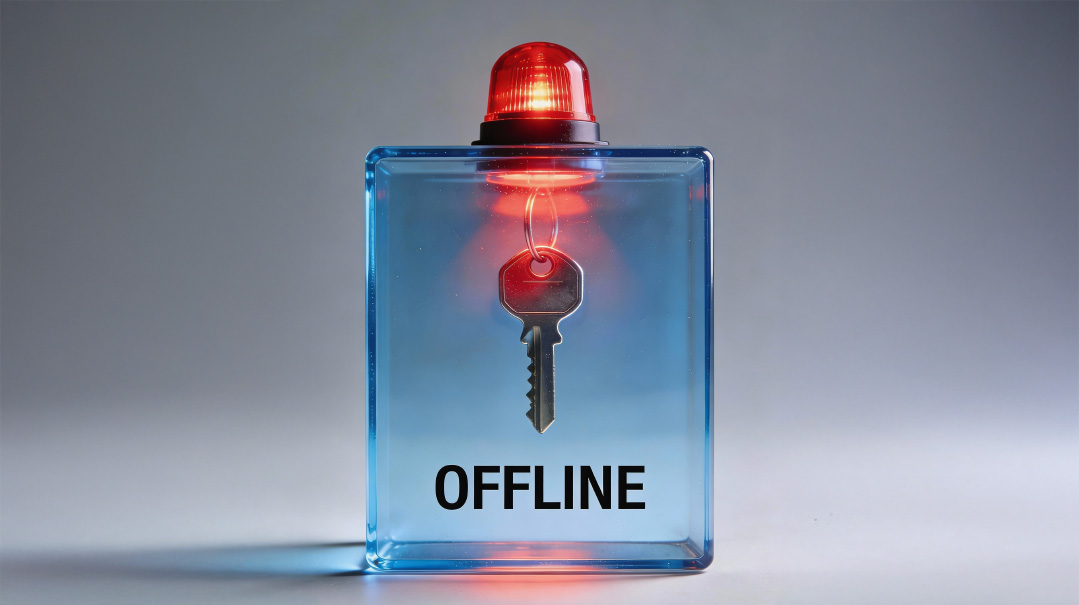Down the Drain
| December 10, 2024True, you gave me my big break. But does that mean I owe you for life?

Cheskel: I know I owe You a debt of gratitude, but at what cost to me?
Shlomo: I turned you into the most popular plumber in the community — and now i have to pay your premium rates?
Cheskel
The first call of the morning came in before 7 a.m. A burst pipe, flooding in the kitchen, a panicked mother, house in disarray. In the background, I could hear the usual commotion — little kids, still in pajamas, probably slipping and sliding around as their mother tried frantically to put breakfast together on the stairs.
“I’ll be there in ten minutes,” I said briskly, tucking my phone back into my pocket. There was a reason I always davened vasikin; a plumber’s day starts early.
Mrs. Halb hovered anxiously as I shut the water valve and took a look under the sink. The problem was easy to spot: an old fitting, a weak joint, and there — the burst pipe. Now, the cabinet beneath the pipe is flooded, and water has probably leaked into the basement below, too.
First things first: I got to work on removing the damaged section of the pipe and replacing it with a new pipe part and fitting. Then, I tested the rest of the joints — some of them looked almost ready to give out, and needed replacing as well.
I was wrapping things up when another call came in; it was Ezzy Fishman, manager of Bagel Basket, a local café.
“Cheskel? Oh, good, you picked up. We have a plumbing issue here, clogged toilet. Can you come by?”
I checked the time; I had several clients lined up that day. There was a custom rainfall shower installation, a consult with a contractor for the plumbing layout of a new office building, and an inspection for someone who had called worried that their pipes had corroded and were causing discoloration of the water. And that was aside from the regular emergency calls that came in all the time.
I could fit Bagel Basket in before the shower installation, though.
“I’ll be there in twenty minutes,” I told Ezzy.
S
ome 12 hours later, I was headed home, after an urgent detour to check out a problem with the water heating system in an apartment complex that left several families without hot water. Originally, I’d been running on schedule for supper with my family and a relatively early night, but the hot water issue took a while to sort out, and by the time I got home, it was late. Minna was used to it; she’d left my plate in the microwave, ready to warm when I got home.
The house was quiet. I was exhausted, but also, it felt good, really good, to come home with the satisfaction of having checked off all the boxes.
The satisfaction of working hard, getting things done, solving people’s real problems in good time….
I enjoyed my work. And more than that, I was grateful simply to have work. Even though years have passed, the memory of those long months of unemployment still made my heart clench.
The stress: How will we make it through the month?
The shame: Why can’t I just find a job, like everyone else?
The fear: What’s going to be with paying the rent, the bills, clothing, groceries? Where will we go when the money runs out?
It was Shlomo, an old friend of mine and a successful contractor, who had suggested that I go into the plumbing field.
“You’re good with your hands, you know a lot already, and there’s a need for good, reliable plumbers out there,” he’d told me. “I have jobs that I need done all the time; I’d be happy to send some work your way.”
A plumber? I’d been looking for an office job, but after months of fruitless searching, the idea… spoke to me, somehow.
Working for myself sounded tempting.
Working out of my car and doing jobs in people’s houses… maybe that would be a better direction to take than constantly running to the dry cleaners with my suit, getting dressed up for interviews in cold, dreary offices….
Interviews that, in all honesty, were not getting me anywhere at all.
So I went for it. I had to borrow money to invest in training, and it took several years of apprenticing and learning the trade before I could get my own license and put out my shingle, but eventually, it happened. Shlomo, true to his word, hired me to work with him on a home renovation; the house had been terribly damaged by flooding, and needed pipes replaced and the water system restored.
It was my first “real” job, and Shlomo was a good friend who promised to help get my name out by recommending me to others in the field. I charged him a significantly reduced rate, which made it a win-win for both of us. He got high quality (if I could say so myself) work for rock-bottom pricing, and I got my first big break, and a “client” who would now recommend me to others.
It paid off — Shlomo’s connections were my first clients, and since they were mostly in the construction industry, the jobs were often large-scale. My name spread around the community and I started getting several calls a week for plumbing emergencies and smaller jobs in people’s houses. Shlomo also called me often, for jobs as big as installations for a new high-rise apartment building to something as minor as a leaky faucet in his own house. I did his work at a discount. After all, he was a good friend, and the one who’d set me up in the field.
Over the next couple of years, we fell into a sort of routine: I was his on-call plumber, he called me often with jobs and leads, and at the same time, continued to give warm recommendations to his friends and acquaintances about me.
A
nd then — much like a water system that springs a leak, which somehow turns into a flood — the trickle of calls, clients, jobs, turned into a deluge.
My calendar started filling up well in advance — apart from, of course, the plumbing emergencies that constantly cropped up, which I made sure to leave flexibility for. I put up my rates, hired a couple of workers. Business was booming.
And yet….
Shlomo was still calling. Very often. And while it was nice to see that he appreciated my work, I couldn’t help but feel that he was starting to take this “cost price plumbing” thing for granted.
“Cheskel, what’s the good word?” he greeted me one morning after shul. “Big project on now, do you have some time?”
“Let’s hear,” I said, carefully.
The “big project” turned out to be a new office space under construction. Shlomo wanted me to come in to install the plumbing features, set up the water line, run the pipes, the works.
It was a big job. But at the rate Shlomo usually paid, it would be a sheer waste of my time.
Still, I didn’t want to be ungrateful. Shlomo had set me up in the field, and given me his clients and contacts. He’d been the first to trust me when I started out on my own. I owed him a lot.
“I have some time opening up next week,” I said.
“Great,” Shlomo told me. “I’ll shoot you the details, okay?”
When I saw Shlomo’s messages, my eyes widened. This was a big job. It would take me all week — and at the old rate, I’d barely earn anything, especially now that I was paying workers, too….
I took a deep breath and texted him a quote. It was more than I’d charged him in the past, but still the minimum I could afford to do it for, covering my costs with a small profit margin, yet still was a fraction of what the job should’ve costed.
Shlomo sent back a terse ok. Was he surprised? Upset? I hoped not — I was doing him a tremendous favor even with the price increase.
T
he next week, I discovered just what a favor it was.
“Mr. Wein? I’m calling from Bais Shmaya, we have a problem….”
Bais Shmaya was the largest local school, with a gym that doubled as an event hall in the evenings. And that gym, apparently, had suffered a massive flood overnight when a pipe burst. The water had spread to the areas nearby, including locker rooms and hallways, and the gym’s expensive hardwood flooring was damaged. If things wouldn’t be contained in time, the gym could become unusable for weeks.
It was a huge job. And an emergency, which meant premium rates. Plus, a school like Bais Shmaya was a very worthwhile client to have. But….
“I’m sorry,” I told the administrator regretfully. “I’m fully booked up at the moment.”
I’d already started Shlomo’s project. I couldn’t back out now — I never did that to clients who scheduled in advance; they were relying on me, and delaying could cause problems across the whole construction project. But when I thought about the minimum wage I was working for, compared with what I could have earned taking care of Bais Shmaya’s emergency….
The project took time, and even though I still fit in a few smaller house calls in the early morning, I basically had to throw myself into the office space project, full force. I turned down several returning clients who wanted small repairs or jobs done. Then I got a call from a doctor’s clinic, a problem with their water pressure or something. It was another potentially big job, another client that would be very useful to have in the future.
I considered leaving my workers doing Shlomo’s work and heading down there myself. But before I could even explain the situation, Shlomo beckoned me over to ask about the progress of the installation.
“We’re kind of rushing, do you think it could be finished today?” he asked.
The resentment that had been building up inside me came to a head. Now he wanted a rush job, too, still at cost price, while I had to turn down premium opportunities to cultivate new relationships, at top dollar?
T
he next time Shlomo called with some emergency — a major roof leak in the building project after a storm one night — I took a deep breath. I thought about the way I’d raised my rates several times over the past few years, and yet had always stuck to the original, bare-bones, fraction of the going rate when I worked for Shlomo.
“So yes, I can come over this morning,” I said slowly. “I just wanted to say — about the rate. It’s a big job, and I usually charge more for emergencies….”
“Yes, yes, of course,” Shlomo said jovially. He probably thought I would tack $50 on to the price or something.
In the past, I would never have done this… but hadn’t I given him discounted rates for long enough? Wasn’t it time to move on and treat this as a real job, in all ways? I wanted to give him the great service I gave everyone else, after all. And doing that while stewing in resentment….
“What I wanted to say is… I usually give you a discount. It’s actually a pretty steep one… it’s far less than I charge anyone else.”
“Right,” Shlomo said, matter of factly. “I appreciate it.”
Appreciate? The tone of voice was… too matter of fact. Like this was a given. Of course he gets a discount.
“It’s just — I can’t do it like that anymore,” I said, stumbling over the words a little. “I need to give the same rates to everyone, and—”
Now his voice changed. “What are you saying, Cheskel? This repair is going to cost….”
I tried to pretend I was talking to any other client. “I’ll have to come and assess the damage before I can give you an exact quote. But based on what you’re telling me, it will include an emergency rush fee and repair service.”
And then I named the price range.
Shlomo stopped short. “What did you say?” he asked, startled.
I gave him the quote again, explaining the this was my regular rate for such a job, including the emergency rush free.
“Oh. Wow. I hadn’t been expecting that.”
Something flared up inside me. Hadn’t been expecting that? This was the market price for the job, for someone with my experience and qualifications. So he did me one favor years ago — okay, a big one, got me started, set up in a profession where I’ve really seen hatzlachah — but does that mean I owed him discounted rates forever? Even when I was charging three or four times the amount for everyone else, even when his jobs were getting more frequent and larger and costing me more and more in profit that I could’ve made elsewhere?
“It’s the going rate,” I said. “It’s what I charge everyone else.”
If I could tell Shlomo one thing it would be: I’ve been giving you steep discounts for years — but it’s costing me and my business too much to continue.
Shlomo
“Shlomo, do you have a minute?”
I turned to see Nachum, an acquaintance who, I’d heard, was starting out in the construction industry. He probably wanted some advice, and I was happy to offer it.
I’ve always worked on being generous with my time, resources, and expertise — even when those asking for it were technically “competition.” A rising tide lifts all boats, and all that, and there was plenty of work to go around. And besides, most of these relationships turned into real win-win ones — when I wanted to sub-contract a job, if I was looking for a partner in some enterprise, or when I needed referrals for various vendors.
I was happy to offer Nachum some tips about the project he was starting, and he nodded rapidly, taking notes on his phone.
“Oh, and for plumbing? Cheskel Wein is your man. Top quality, honest, quick but thorough. He’ll never let you down.”
Cheskel was an old friend of mine. Years ago, when he’d been out of a job for a while and really fallen on hard times, I was the one who’d advised him to go into plumbing. He’d always been handy, the guy in the yeshivah dorm who knew how to fix the leaky faucet and got the rusty air conditioning unit functioning reasonably well. And once he had his own license, I took a gamble and stopped using the plumbing company I’d worked with until then to hire Cheskel for a big project instead.
It turned out to be well worth the risk. Like I told Nachum — like I told anyone who asked for my recommendation — Cheskel was really good, and just so pleasant and easy going to work with. Knowing that I was helping a fellow frum Yid earn a parnassah made it all the more satisfying. And the good rates he offered me in appreciation for the fact that I was the one who helped him start out was the cherry on top.
It had taken him time to really break into the field. I remember meeting him in shul, a few weeks after that first big job, and asking how work was going.
“Good, good,” he said, but he was avoiding my eyes.
I thought for a moment. “Actually, I have a job for you, the pipes in my kitchen at home need some looking at. I think they might be getting clogged.” I hadn’t thought anything of the sort until that moment, but which heavy-use kitchen didn’t need its pipes and drains inspected and cleaned out every so often? “Do you have any time this week to look at them?”
“Oh! Yes, sure,” he said, pulling out his phone. I caught a glimpse of the calendar that he pulled up. Empty. “Uh, when is a good time for you? I’m pretty flexible….”
I wanted to take him aside and offer some tactical business advice — never seem too eager, always give the impression that you’re finding a small available time slot in a busy week — but now wasn’t the time. It would simply mortify him.
Cheskel spent a while on my drains; I don’t think they ever had been, or would again be, quite so clean.
He charged a nominal fee, even though I tried to give him a little extra. “No, no,” he protested. “I want to give you a discount, really.”
It was his way of giving back, I realized. I’d set him up, given him job opportunities… he wanted to keep this a friendship, not a chesed cause.
I paid him the modest fee, and then had an idea.
Maybe giving him more money wasn’t the answer. But giving him more clients could be.
I didn’t say anything to Cheskel. I didn’t want to raise his hopes, and I also didn’t want him to feel embarrassed or indebted. But later that night, I made a string of calls to contacts in the construction industry, promoting Cheskel’s excellent services and recommending that they try him out next time they needed a plumbing project done. I also texted a bunch of friends and neighbors with Cheskel’s number.
Great plumber, reasonable prices, used him today, very happy. Passing on in case it’s useful, I wrote.
When I saw Cheskel in shul next, he looked — taller, somehow. Spotting me, he came over and said, “Hey, I’ve been hearing that you recommended me to a couple of people, thanks! Appreciate it.”
“It’s nothing,” I waved him off. “Just telling them the truth — people are always looking for a good plumber.”
Cheskel chuckled, glanced at his phone, and said a quick goodbye. “Better run, had a few calls this morning.”
A few calls turned into a few happy customers who started passing Cheskel’s name on, too. His work was good, and quick, and he was reliable and pleasant to work with. I wasn’t surprised when his name got “out there” and I began hearing, when I recommended his services, that the person had heard of — or even used — Cheskel’s Plumbing Services already.
“Cheskel Wein? Yeah, someone mentioned the name to me,” the administrator of Bais Shmaya said.
“Wein? He installed my friend’s bathroom, she highly recommended,” another customer of mine told me.
Now, several years on, Cheskel had become the most popular plumber in the community. Everyone used him, contractors, families, businesses… and he was harder to get hold of. Now I started feeling the pinch — instead of having a plumber I knew and trusted available for the jobs that came up, I was stuck trying to catch him between his crammed schedule and the daily emergencies that are part and parcel of a plumber’s life. But still, it was all good. I wanted him to succeed. That’s what I’d wanted all along.
I
was managing a large construction project when I next needed Cheskel’s services. It would be a big job, but I knew Cheskel had grown his team recently, and he’d done plenty of jobs like this before.
“I should have some time next week or the week after…” he told me thoughtfully, scrolling through his phone calendar.
Wow — he sure was booked up. I couldn’t help but remember the time when he’d had nothing lined up, and I’d hired him to clean and check the drains in my house…. Seems like we’ve come a long way since then.
“Could next week work? Things are moving fast with this project and I don’t want it to get delayed.”
Cheskel seemed to weigh the options for a few moments. “I guess next week could work.”
He sounded grudging. Why? Wasn’t I a client — his first one, and a supremely loyal one at that?
In fact, I realized, ever since he’d started out in the field, I hadn’t used another plumber besides him.
Was the problem that I received discounted rates? But wasn’t that because we were friends, we’d worked together for years, and I was the one who’d pretty much gotten his business off the ground in the first place?
HE
did the office space job. Did it well, and fast, and thoroughly, like he did every job. But somehow, I felt like….
Like he was avoiding me.
I paid for the job — a higher rate than usual, I guess he raised his prices, so the discounted price was raised proportionately, too. But even when I tried to thank him and engage in friendly conversation, he seemed rushed, disinterested.
Maybe he was just busy. Maybe there was something else going on in his life….
But I couldn’t shake the feeling that this was about me.
And then there was the morning that I showed up to the almost-complete office space construction project, to find it in chaos.
“The roof,” one of the workers told me, looking distressed. “The storm last night… something in the roof gave way, there’s a major leak, we need a plumber over, ASAP.”
A plumber? Well, this was an emergency… and I knew Cheskel left time open for those. He would fit me in to deal with this. At least I hoped he would — I hadn’t built other connections in the field for years now, and this would be a costly job. I didn’t want to start hunting for recommendations and trying to find a new plumbing company while I was stressed out over the emergency and the damage. And this was his own job — he knew the site, knew the plumbing, would be able to get it sorted and fixed much quicker than someone else.
Cheskel didn’t answer the phone right away. I hesitated, then texted him, and then called again 15 minutes later. Finally, he picked up.
“Cheskel, so happy you answered. We have a small emergency over here,” I told him, and explained the situation.
“So yes, I can come over this morning,” Cheskel said, and I exhaled in relief. “I just wanted to say — about the rate. It’s a big job, and I usually charge more for emergencies…”
“Yes, of course.” That was fair enough, he’d done that in the past, too, added a small amount for the rush job.
“What I mean is…” Cheskel was taking time getting to the point. Which wasn’t like him. I frowned. “So I usually give you a nice discount… I charge you less than I charge anyone else….”
“Right…?” I said, wondering where this was heading.
“So I wanted to say… I can’t do it anymore. I need to offer the same rates to everyone, my prices have changed a lot over the years….”
Same rates to everyone? How did that come in, and why? Was it just about this job, and the fact that it was an emergency one?
“So the repair this morning will cost….”
The number he dropped startled me. It was more than I’d ever heard him quote before.
So that was his full price. Plus, the rush fee, plus the emergency fix, temporary solutions, whatnot….
“I hadn’t expected that,” I blurted.
“It’s the going rate. What I charge everyone else,” he said sharply — too quickly, like he had just been waiting for a chance to say it. “To be honest, the discounts I’ve been giving you all these years… they ended up costing me thousands. So I’ve changed my policy. I have to charge the standard rate to everyone.”
The standard rate. The standard, premium rate. Because, of course, he was the most sought after plumber in the community.
Because of me.
My advice. My contacts. The jobs I’d given him, the recommendations, the references.
I’d given up my own relationships with other plumbing companies and thrown myself behind his, in order to support him. In order to help him support himself.
And now that he’d become popular and successful he was turning around and leaving me high and dry — needing to pay his top-dollar prices, or be left stranded?
If I could tell Cheskel one thing it would be: Your tremendous success and customer base is thanks to my work on your behalf — and now, you’re using that against me?
(Originally featured in Mishpacha, Issue 1040)
Oops! We could not locate your form.







